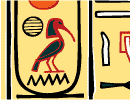| Osiris, Asar From
the hieroglyphic texts of all periods of the dynastic
history of Egypt we learn that the god of the dead, par
excellence, was the god, whom the Egyptians called
by a name which was commonly known to us as
"Osiris." The oldest and simplest form of the
name is written by means of two hieroglyphics, the first
of which represents a "throne" and the other an
"eye," but the exact meaning attached to the
combination of the two pictures by those who first used
them to express the name of the god, and the
signification of the name in the minds of those who
invented it cannot be said. In the late dynastic period
the first syllable of the name appears to have been
pronounced Aus or US, and by punning it was made to have
the meaning of the word usr, "strength of
the Sun-god Ra. This meaning may
very well have suited their conception of the god Osiris,
but it cannot be accepted as the correct signification of
the name. For similar reasons the suggestion that the
name AS-ar is connected with the Egyptian word for
"prince," or "chief," ser, cannot be
entertained. It is probable that the second hieroglyphic
in the name As-ar is to be understood as referring to the
great Eye of Heaven, i.e., Ra, but the connection of the
first with it is not clear, as we have no means of
knowing what attributes were assigned to the god by his
earliest worshippers the difficulty is hardly likely to
be cleared up. The throne or seat, is the first sign in
the name of As-t, who is the female counterpart of
Osiris, and it is very probable that originally the same
conception underlay both names. It is useless to argue
that, because the dynastic Egyptians at a late period of
their history substituted the disk of Ra, for the god
hymns in which they identified him as the source of light
and as Ra, therefore As-ar, and because they addressed to
the god hymns in which the priests resorted to whenever
they attempted to find etymologies for the names of their
gods.
In comparatively late time Osiris was called Un-nefer,
in religious and mythological texts, and the priests
{like modern Egyptologists} tried to explain the name.
The writer of a hymn quoted by Dr. Brugsch derived the
word from un, "to open, to appear, to make
manifest," and neferu, "good things," and
when he wrote, "thy beauty {or goodness}
"maketh itself manifest in thy person to rouse the
gods to life in "thy name Un-nefer," it is
clear that he was only making a play of words on the name
"Un-nefer' ; and again when he wrote, "Thou
comest as the strength {usr} of Ra in thy name of Asar
than to afford a trustworthy derivations of the name of
Osiris. We may note in passing that modern derivation and
explanations of the name Un-nefer are equally
unsatisfactory. The truth of the matter seems to be that
the ancient Egyptians knew just as little about the
original meaning of the name As-ar as we do, and that had
no better means of obtaining information about it than we
have.
Passing now to the consideration of the original
charcterteristics and attributes of Osiris we find that
the oldest religious texts known to us refer to him as
the great god of the dead, and throughout them it is
tacitly assumed that the reader will understand that he
once possessed human form and lived upon earth, and that
by means of some unusual power or powers he was able to
bestow upon himself after the death a new life which he
lived in a region over which he ruled as king, and into
which he was believed to be willing to admit all such as
had lived a good and correct life upon earth, and had
been buried with the appropriate ceremonies under the
protection of certain amulets, and with proper recital of
certain "divine words" and words of power. The
worship of Osiris is, however, very much older than these
views, which is clear, could only belong to a people who
had advanced to a comparatively high state of
civilization and mental development.
The oldest authorities for the religious views of the
ancient Egyptians are the "Pyramid Texts,"
which are known to us from copies made in the IVth, Vth
and VIth Dynasties, that is to
say, in the remote time the period of their highest
development ; even at this remote time the priests of
Annu had composed a system of theology which was
supported by the authority of the king and his high
officials, and there is no doubt that it was based upon
older systems of religious thought and belief. What these
may have been it is useless to speculate, and all that is
certain about the Heliopolitan system is that, while
proclaiming the supremacy of their local god Tem or
Ra-Tem, its priests took care to include in it as many of
the ancient provincial gods as possible, and to adopt,
wherever they were able to do so, the ancient beliefs and
traditions concerning them. Among such gods Osiris held a
very prominent place, in fact he was in respect to the
dead and the Underworld what Ra, or Ra-Tem was to the
living and to this world, and in some passages he is
referred to simply as "god," without the
addition of any name. No other god of the Egyptians was
ever mentioned or alluded to in this matter, and no other
god as any time in Egypt ever occupied exactly the same
exalted position in their minds, or was thought to
possess his peculiar attributes.
HYMNS TO OSIRIS
WORSHIP OF OSIRIS
ANGELS OF THOTH
FORMS OF OSIRIS
FUNERAL OF OSIRIS
NAMES OF OSIRIS
|





